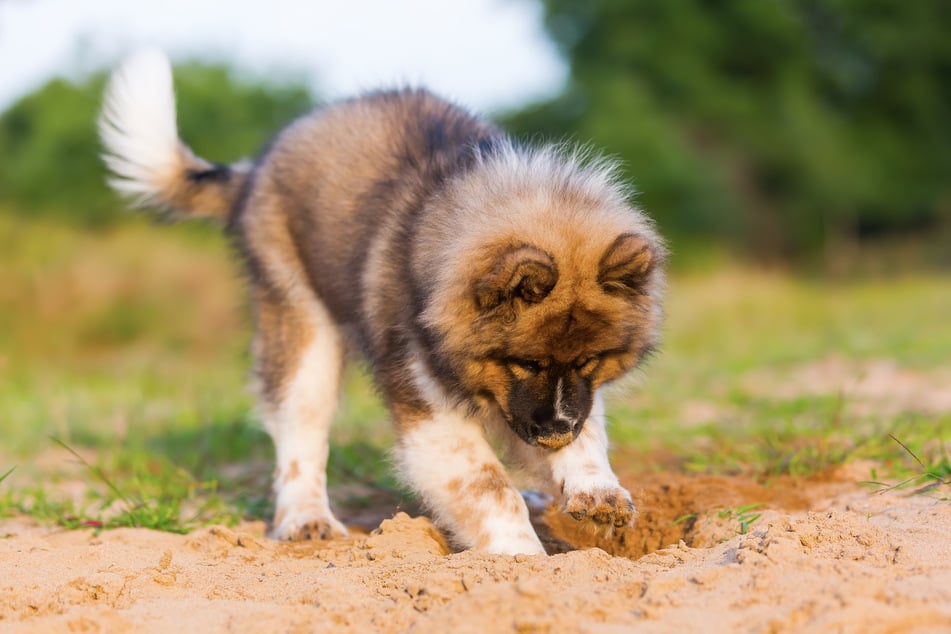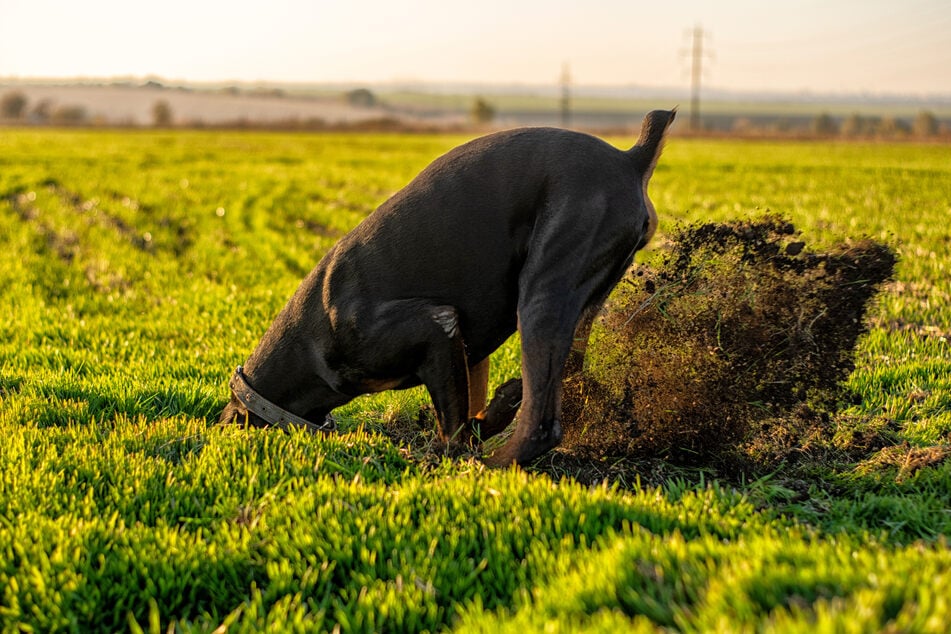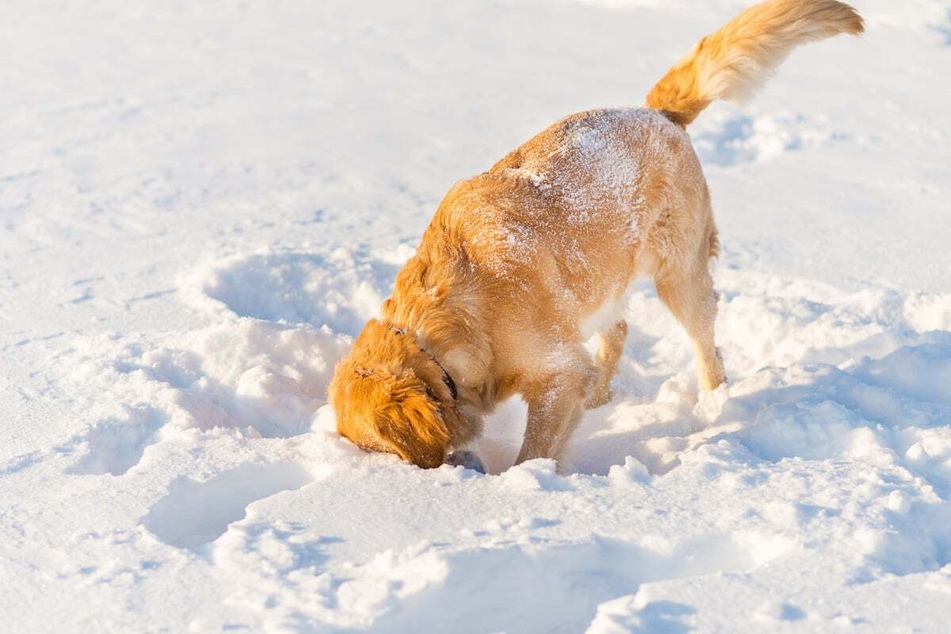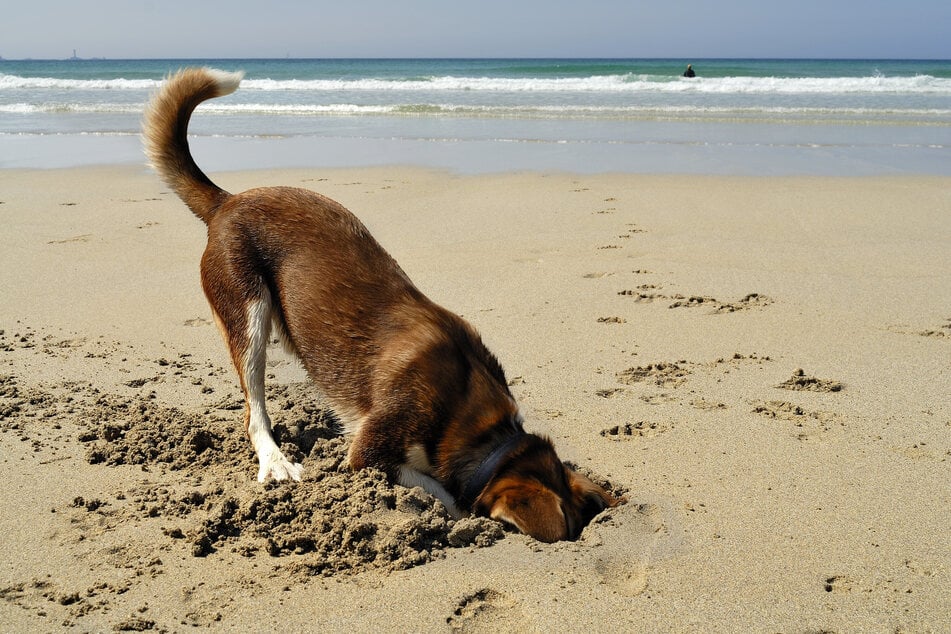Why do dogs dig and how to stop it
Whether it's in the depths of winter, delving deep into the fluffy white snow, or your backyard vegetable patch, dogs adore digging. But why do dogs dig and what can you do to keep your garden safe?

While every dog is different, most pooches will love to dig from time to time.
Our canine companions adore the feel of dirt on their paws, and many even like to hide various items in the holes that they may be spreading all over your backyard. It's a strange and harmless habit, but can be extraordinarily annoying for any avid gardener.
So why do dogs dig holes, and why do they sometimes try to burrow into beds, carpets, and couches as well?
And most importantly for those of you who are desperately trying to protect your flower beds, what can you do to stop it? TAG24's dog guide has you covered!
Why do dogs dig holes?
Dogs like to dig mainly because it is a therapeutic and instinctual activity that links them to a world before they were domesticated. Digging allows a dog to not only exercise their instinctive need to search and hide, but relieve anxiety and find comfort within a space that they might be unfamiliar with.
Young and active doggos are particular fans of digging, exploring the world around them through the excavation of earth, snow and sand. While digging might be irritating for the humans who then have to deal with the mess it creates, it's actually a necessary part of your pup's development, much in the same way that proper training is in a more practical sense.

Dogs dig to search and hide
Your dog will often dig with a specific goal in mind. Sometimes that goal will be simply to tunnel under the fence and explore the outside world, or to find something that it can smell. In other situations, it may be trying to hide something that it deems its "property" or "prey," so that it is safe and secured and can be dug up later.
So why does your dog want to search for and hide things?
Hiding possessions: Dogs will often bury their toys, treats, and things that they have found around the place. This goes back to an instinctive need to protect what is there's and conserve it for later. In the wild, dogs catch other animals and, having killed their prey, will not eat them all at once. Instead, in many cases, dogs will save things for later by burying them in the ground. In the domestic context, this also goes for items and toys that are considered their possessions.
Searching for prey: If your dog has buried something, it may want to dig it up again. Separately, curious canines will often look for things that they can smell and which interest them. This will cause them to dig in search of insects, poop from other dogs, or similar things.
As usual, it all comes down to instinct. Your dog will want to both search for things and hide things, and it needs to be allowed to do that where feasibly possible.
Dog digging reduces anxiety
Digging can also reduce stress and relieve boredom simply because it is an enjoyable activity to engage with. In many cases, excessive digging can be a result of insufficient physical and mental exercise. Perhaps you are away too much, your house is too small, or you don't take your darling doggo on enough walks.
On top of that, digging serves a physical purpose as well, because it grinds down your dog's nails. This ensures that your dog is comfortable when it walks and doesn't hurt itself because its claws are too long. Such things can cause a great deal of distress in dogs, so anything that reduces that discomfort also reduces dog anxiety and unhappiness.
Keep in mind that stressed dogs will dig, and take proactive steps to resolve those issues if you are finding that your dog is digging more than usual. It's just a matter of observing and reacting.
Dogs dig for comfort

Dogs, like humans, want to feel comfortable and happy in their space. As a result, when they dig, they might be trying to create such a space for themselves. It is worth mentioning, of course, that a dog's habit of digging can indicate that they perhaps don't feel particularly comfortable and happy in their given environment. This is something that can be resolved with pretty basic steps.
You might have noticed that your dog always digs around in its blankets and bed before sleeping. Don't worry too much, as it is simply making the spot more comfortable. Its ancestors would have to sleep on the hard ground, and digging would soften it.
Making sure that your dog is happy and comfortable is incredibly important, so we'd recommend simply letting your dog do what it has to do.
Important: Female dogs often dig when they are pregnant or in heat. This is considered "nest building" and is triggered by hormones. You don't have anything to worry about, but if you are suspicious that something like this is happening, it might be a good idea to go to the vet.
Why do dogs dig on beds, carpets, and couches?
The act of digging into beds, carpets, and couches, all simply relates to comfort. A dog that dives into its blankets, making a hollow for itself before settling down, is likely looking to make itself feel more secure and comfortable in its environment. This is a totally natural behavior, even if it might be annoying when it leads to tears in blankets and pillows.
Top tip: One way to reduce the damage caused by digging into couches, pillows and blankets is to make sure that you have kept your dog's nails as short and blunt as possible. This will also help to keep your furry friend comfortable.

How to stop a dog from digging
While digging is not a bad thing, and should not be wiped out entirely, it can still be a real pain for dog owners who have a nice garden, or simply don't want their perfect pooch to be covered in mud when they get home. In such a case, there are a few things that you can do to reduce digging where possible.
Here's how to stop a dog from digging:
- Having identified the cause of the digging, try to make practical improvements to your dog's life and environment to reduce its need to dig.
- Train your dog properly, from a young age, and make it clear through positive reinforcement where it is okay to dig, and where it's not.
- Keep your flower beds and veggie patches covered and inaccessible from your dog.
- Make sure that you exercise your dog regularly and take it on multiple walks every day, so that it doesn't have an excess of energy.
- Play games like fetch with your dog, to fulfil its need to find and collect things.
There is no way to entirely stop your dog from digging, and nor should there be. Simply mitigate the impacts and work from there.
Digging dogs can be a real challenge
Dogs love to dig, and if you have adopted a dog then you almost certainly know, and have made peace, with that fact. It is still okay, though, to recognize that digging can be a real challenge and a real irritation.
Of course, take whatever steps you can to reduce your dog's digging, and make sure to keep your dog's nails trimmed, but don't expect to be able to eradicate the behavior entirely.
Cover photo: 123RF/Madrabothair




